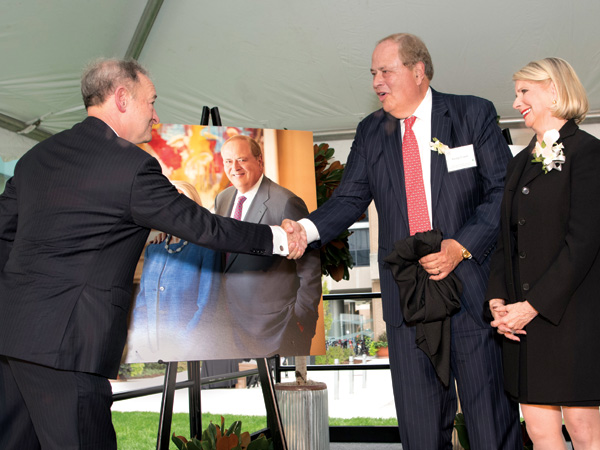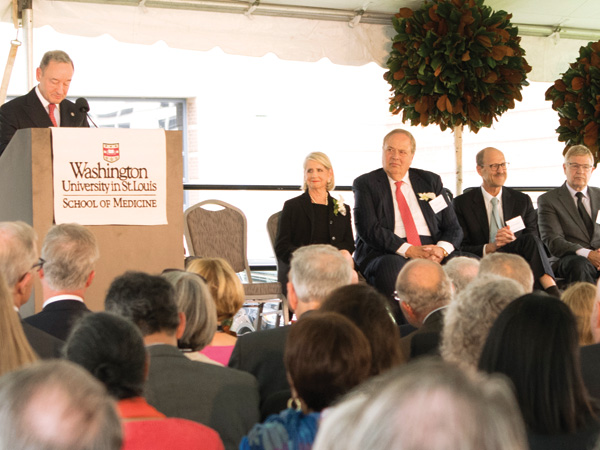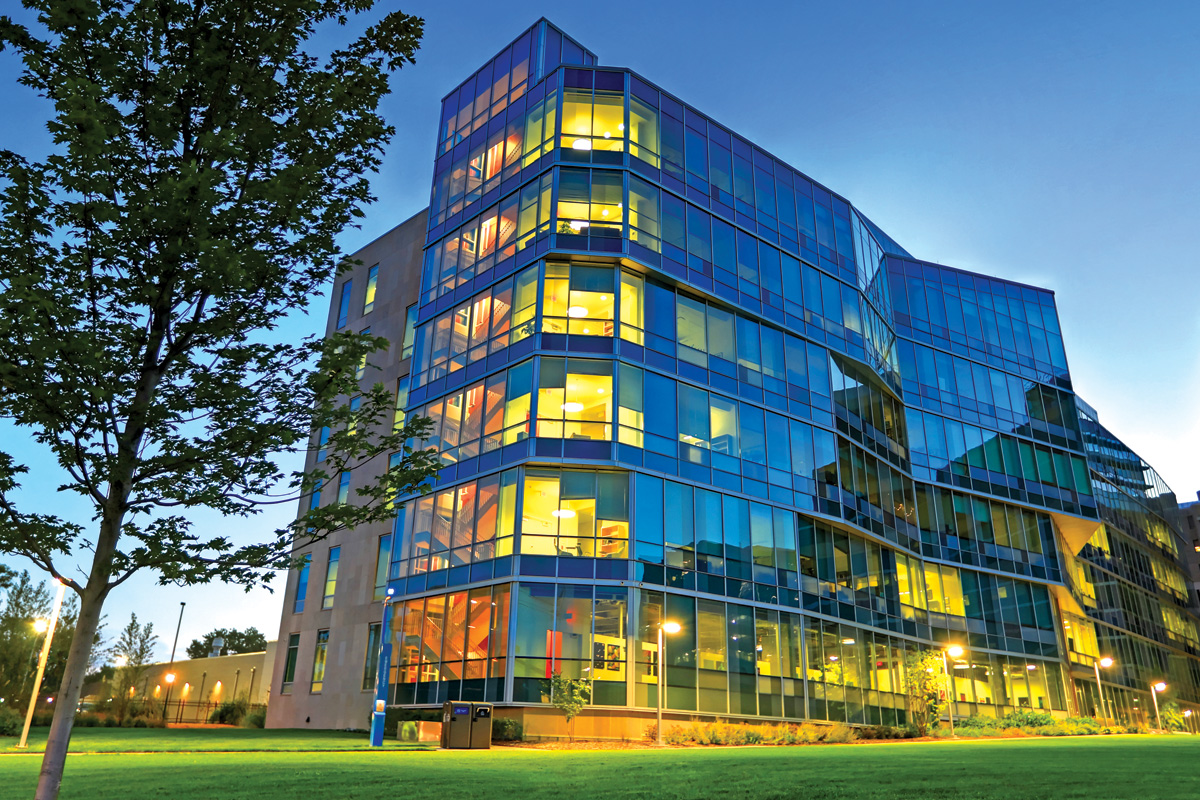
A $10 million gift from longtime benefactors George and Debra Couch is supporting one of the School of Medicine’s highest priorities: research advances in personalized medicine. In recognition of the couple’s pledge, the university has named the newest research building on the medical school campus — a six-story facility located at 4515 McKinley Avenue — the Debra and George W. Couch III Biomedical Research Building. The couple was honored during an Oct. 6 dedication ceremony.
The gift establishes an endowed fund dedicated to initiatives aimed at revolutionizing the way disease is diagnosed, treated and prevented. Because personalized therapies often are rooted in a person’s genetic makeup, the new fund provides support for the Genome Engineering Center (GEC). With the center’s expertise in the latest genome-editing technologies, such as the ability to reprogram stem cells, university scientists are able to create precise cellular models of disease.
“We are deeply grateful to Debra and George Couch for their extraordinary generosity and for their commitment to improving human health,” said Chancellor Mark S. Wrighton. “Their gift will support cutting-edge research by our talented faculty in pursuit of personalized medical solutions for patients. With this generous support, the Genome Engineering Center will be even better positioned as a resource for our investigators, who are working at the forefront of the biomedical sciences.”
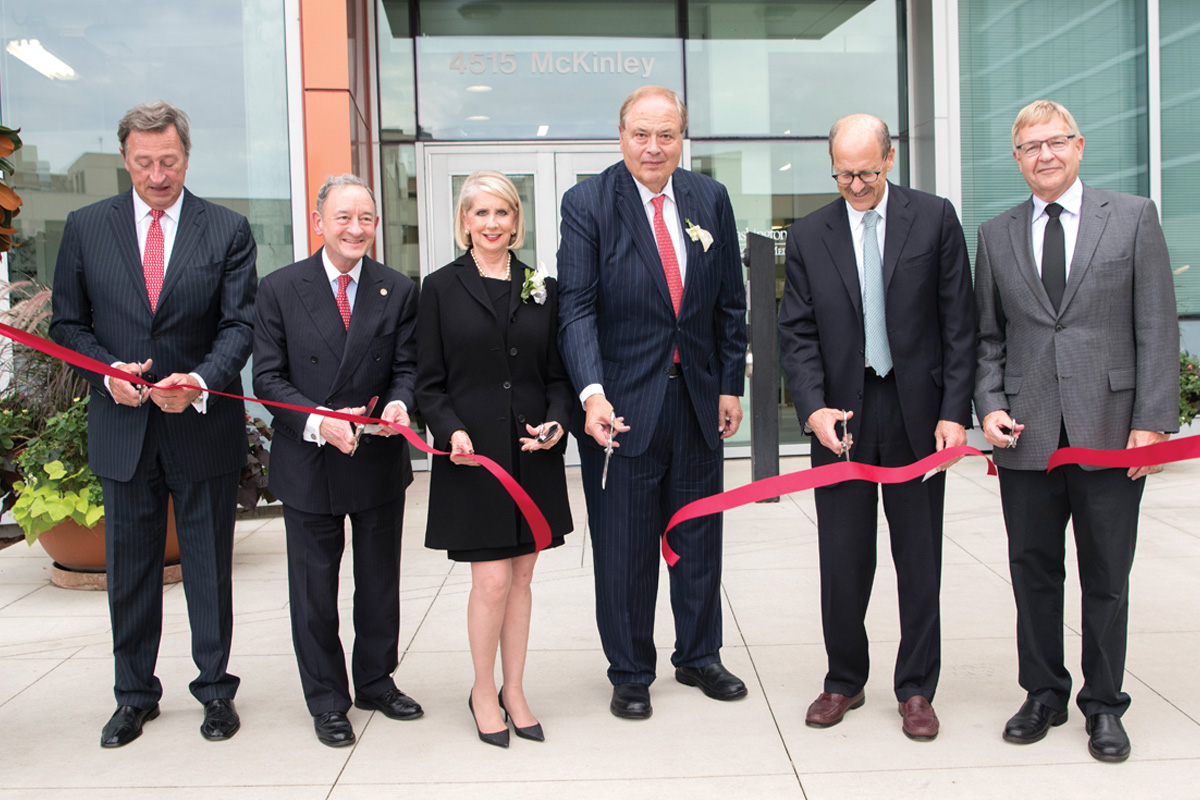
For the past 11 years, Couch has served on Washington University’s Board of Trustees. He also has served as a member of the School of Medicine National Council for nearly two decades — giving him a close-up view of breakthroughs that have transformed the way scientists and physicians approach disease, from the sequencing of the human genome to research illuminating the key roles of the immune system and the gut microbiome in conditions such as cancer, obesity and malnutrition.
“It has been a privilege to be associated with the national council and be exposed to renowned faculty members who are making such a difference in the health of people around the world,” he noted. “As my wife, Debra, and I began to think about our own legacy, we knew we wanted to help advance their work.”
Powerful technology
Jeffrey D. Milbrandt, MD ’78, PhD, the James S. McDonnell Professor of Genetics and head of the McDonnell Department of Genetics, established the Genome Engineering Center in 2013. This gift will help advance the center’s innovative research and support services, particularly providing investigators with the ability to leverage a powerful DNA editing tool known as CRISPR-Cas9.
Developed only five years ago, CRISPR-Cas9 is revolutionizing biomedical research. “The technique allows us to edit genomes in a very precise way,” Milbrandt said. “You use a computer to identify the exact DNA stretch you want to alter and then execute the change rapidly and efficiently. And you can use the same toolkit on any organism.”
GEC experts employ CRISPR-Cas9 and other gene-editing techniques to create cells and cell lines with specific mutations and generate libraries of mutations that help investigators study disease processes, identify drug targets and advance new treatments.
The center also provides expertise in the manufacturing of induced pluripotent stem cells (iPSC). These are cells taken from skin, urine or blood and regressed back into stem cells. From there, they can be made into nearly any cell type. When taken from a person with a particular disease, these converted cells still model the disease process. This opens up new research opportunities, particularly in previously inaccessible cell types, such as neurons.
“The gift will serve as a catalyst for developing biological systems that model diseases in a highly personalized way and for facilitating the development of new diagnostics and therapeutics from biologically validated data — our best hope for discovering precise ways to alleviate human suffering,” said David H. Perlmutter, MD, executive vice chancellor for medical affairs and dean of the School of Medicine.
The GEC is a world leader in the production of engineered cells and cell lines. Since its inception, the center has created more than 300 CRISPR-modified cell lines, including more than 100 derived from iPSCs.
The center has provided services to 200 laboratories at Washington University and about 70 academic institutions and corporations around the globe. The center helps to catalyze the work of university researchers who do not have access to this groundbreaking technology in their own labs. With a thriving GEC as a resource, researchers can better compete for federal grant funding and departments can attract and retain top faculty.
According to Milbrandt, genome engineering and iPSC technologies are developing at breakneck speed. “To keep pace, we must constantly invest in research and development,” he said. “This endowment will allow us to implement new techniques, invest in highly skilled personnel, and purchase equipment that will help us move genome editing into the therapeutic realm.”
In addition to the GEC and the Department of Genetics, the Couch Biomedical Research Building is home to numerous initiatives and centers, including the Edison Family Center for Genome Sciences and Systems Biology, the Center for Cellular Imaging, the Center for Multiple Myeloma Nanotherapy, the Optical Radiology Lab, and the Molecular Imaging Center, and includes research space for the Center of Regenerative Medicine and the departments of Medicine and Radiology.
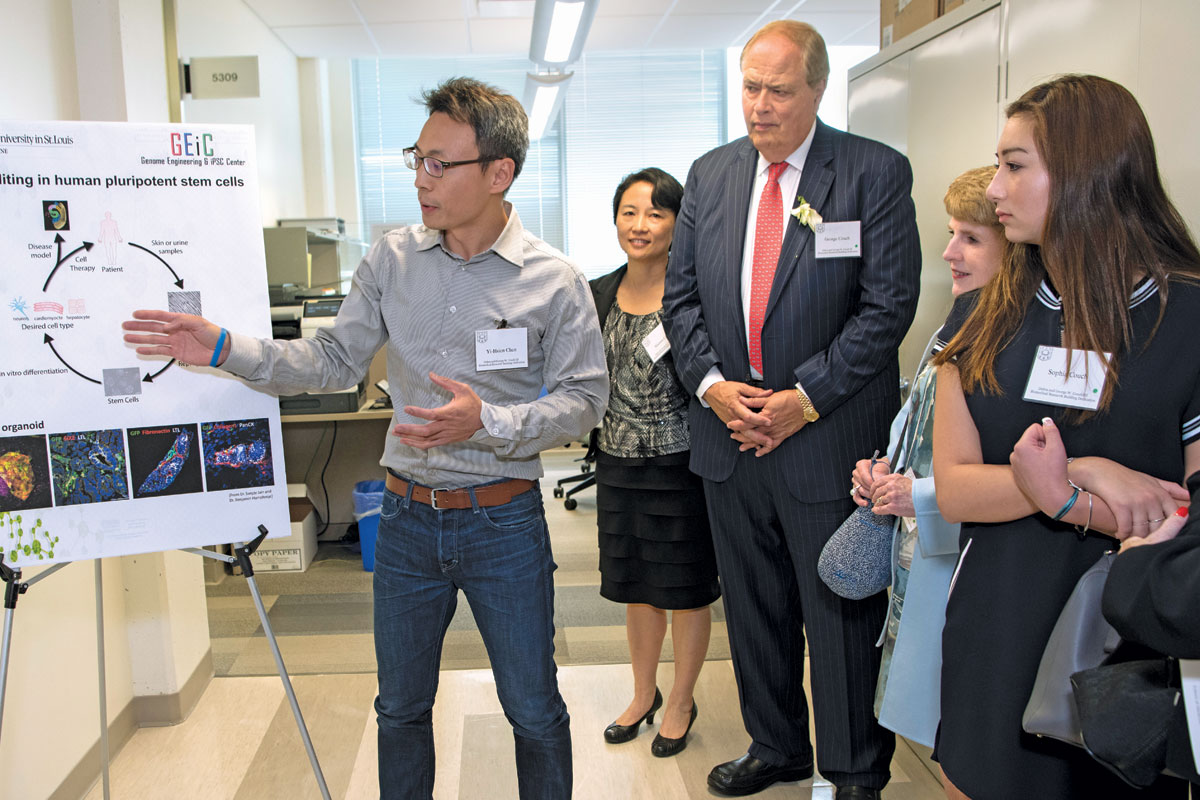
Inspired to help others
For more than three decades, the Couch family has provided significant support to Washington University. George Couch attended high school in St. Louis before earning a bachelor’s degree in economics from Stanford University and a master’s degree in business administration from Harvard University. He is founder, chairman, president and chief executive officer of Couch Distributing Company in Watsonville, California, and his wife, Debra, owns the Debra C clothing boutique in Carmel, California.
The family’s commitment to the school began in 1986 with a very personal motivation — the endowment of the Gregory B. Couch Professorship in Psychiatry in memory of George’s brother, who developed schizophrenia in his teens before dying unexpectedly from a heart attack at age 31. A Washington University psychiatrist treated Gregory while the family was living in St. Louis.
“Gregory was a wonderful person,” George Couch said. “His dream had been to attend medical school and become a doctor, so my family decided to endow a professorship in his memory at the School of Medicine.”
Deanna Barch, PhD, a renowned scientist who studies cognitive and language deficits in disorders such as schizophrenia, holds the professorship.
With the endowed fund in personalized medicine, the Couches saw a unique opportunity to help advance the quality of life for people around the globe by contributing to the next phase of discovery.
“If we are able to help mitigate suffering in any way, that’s a larger contribution to humanity than Debra and I ever envisioned we would have,” George said. “We feel very fortunate that we can do something that has such potential to help others.”
Information for this story was provided by Mary Lee, Julia Evangelou Strait and Channing Suhl.
Published in the Winter 2017-18 issue



